TOYOTA RAV4 HYBRID 2020 Owners Manual (in English)
Manufacturer: TOYOTA, Model Year: 2020, Model line: RAV4 HYBRID, Model: TOYOTA RAV4 HYBRID 2020Pages: 744, PDF Size: 31.43 MB
Page 1 of 744
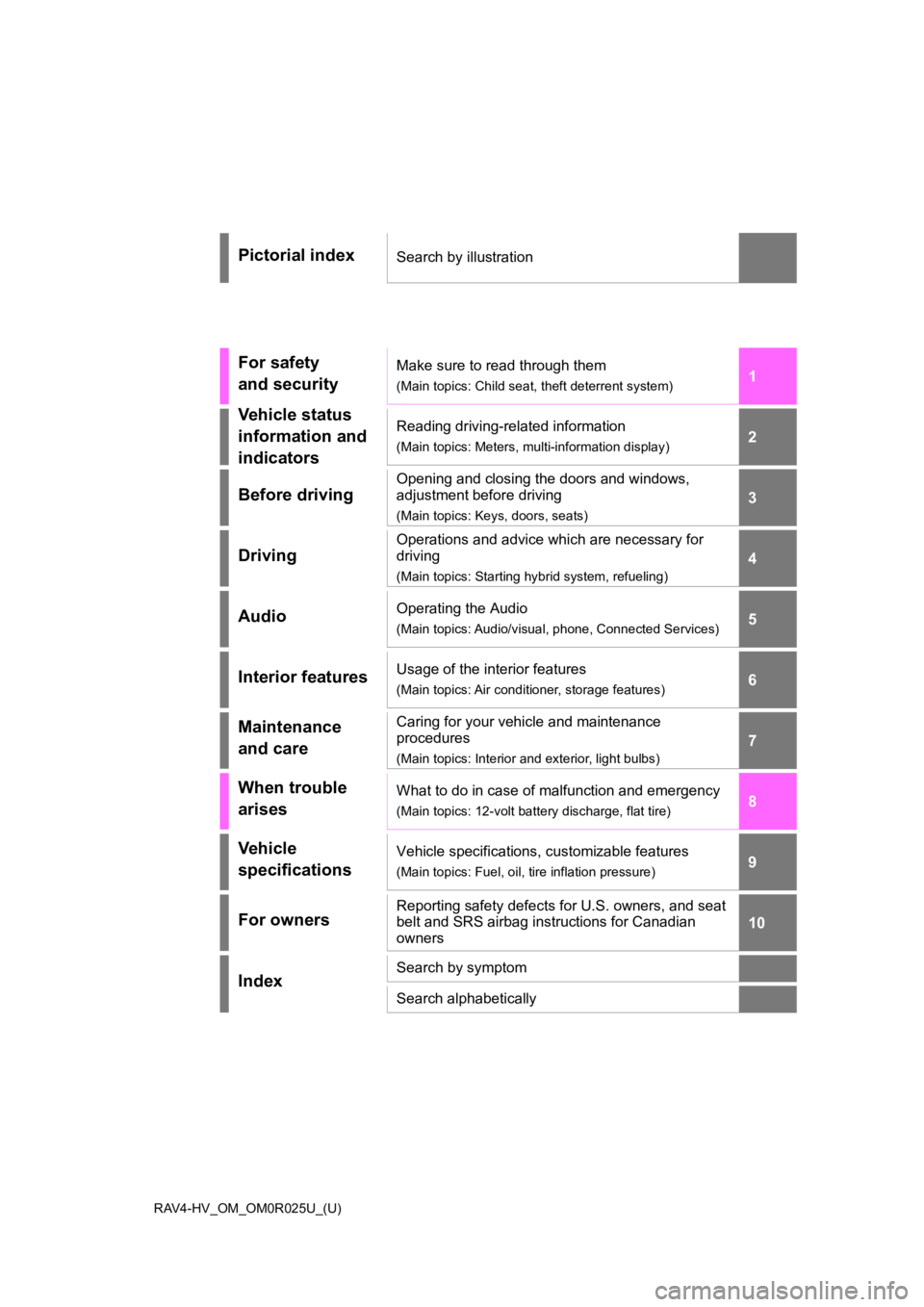
RAV4-HV_OM_OM0R025U_(U)
1
2
3
4
5
6
7
8
9
10
Pictorial indexSearch by illustration
For safety
and securityMake sure to read through them
(Main topics: Child seat, theft deterrent system)
Vehicle status
information and
indicatorsReading driving-related information
(Main topics: Meters, multi-information display)
Before driving
Opening and closing the doors and windows,
adjustment before driving
(Main topics: Keys, doors, seats)
Driving
Operations and advice which are necessary for
driving
(Main topics: Starting hybrid system, refueling)
AudioOperating the Audio
(Main topics: Audio/visual, phone, Connected Services)
Interior featuresUsage of the interior features
(Main topics: Air conditioner, storage features)
Maintenance
and careCaring for your vehicle and maintenance
procedures
(Main topics: Interior and exterior, light bulbs)
When trouble
arisesWhat to do in case of malfunction and emergency
(Main topics: 12-volt battery discharge, flat tire)
Vehicle
specificationsVehicle specifications, customizable features
(Main topics: Fuel, oil, tire inflation pressure)
For ownersReporting safety defects for U.S. owners, and seat
belt and SRS airbag instructions for Canadian
owners
IndexSearch by symptom
Search alphabetically
Page 2 of 744
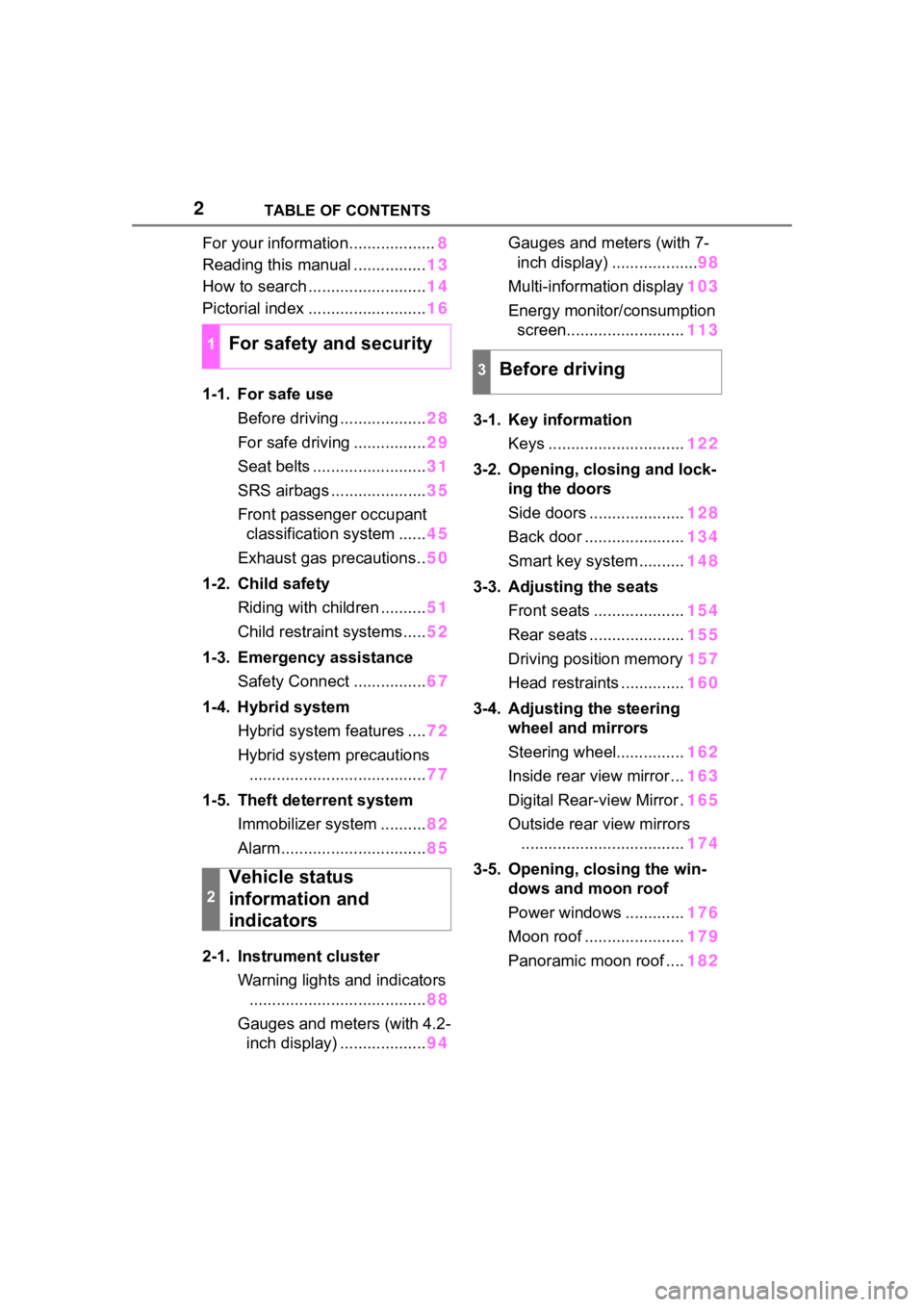
2TABLE OF CONTENTS
For your information...................8
Reading this manual ................ 13
How to search .......................... 14
Pictorial index .......................... 16
1-1. For safe use Before driving ................... 28
For safe driving ................ 29
Seat belts ......................... 31
SRS airbags ..................... 35
Front passenger occupant classification system ...... 45
Exhaust gas precautions.. 50
1-2. Child safety Riding with children .......... 51
Child restraint systems..... 52
1-3. Emergency assistance Safety Connect ................ 67
1-4. Hybrid system Hybrid system features .... 72
Hybrid system precautions ....................................... 77
1-5. Theft deterrent system Immobilizer system .......... 82
Alarm................................ 85
2-1. Instrument cluster Warning lights and indicators....................................... 88
Gauges and meters (with 4.2- inch display) ................... 94Gauges and meters (with 7-
inch display) ................... 98
Multi-information display 103
Energy monitor/ consumption
screen.......................... 113
3-1. Key information Keys .............................. 122
3-2. Opening, closing and lock- ing the doors
Side doors ..................... 128
Back door ...................... 134
Smart key system .......... 148
3-3. Adjusting the seats Front seats .................... 154
Rear seats ..................... 155
Driving position memory 157
Head restraints .............. 160
3-4. Adjusting the steering wheel and mirrors
Steering wheel............... 162
Inside rear view mirror ... 163
Digital Rear-view Mirror . 165
Outside rear view mirrors .................................... 174
3-5. Opening, closing the win- dows and moon roof
Power windows ............. 176
Moon roof ...................... 179
Panoramic moon roof .... 182
1For safety and security
2
Vehicle status
information and
indicators
3Before driving
Page 3 of 744
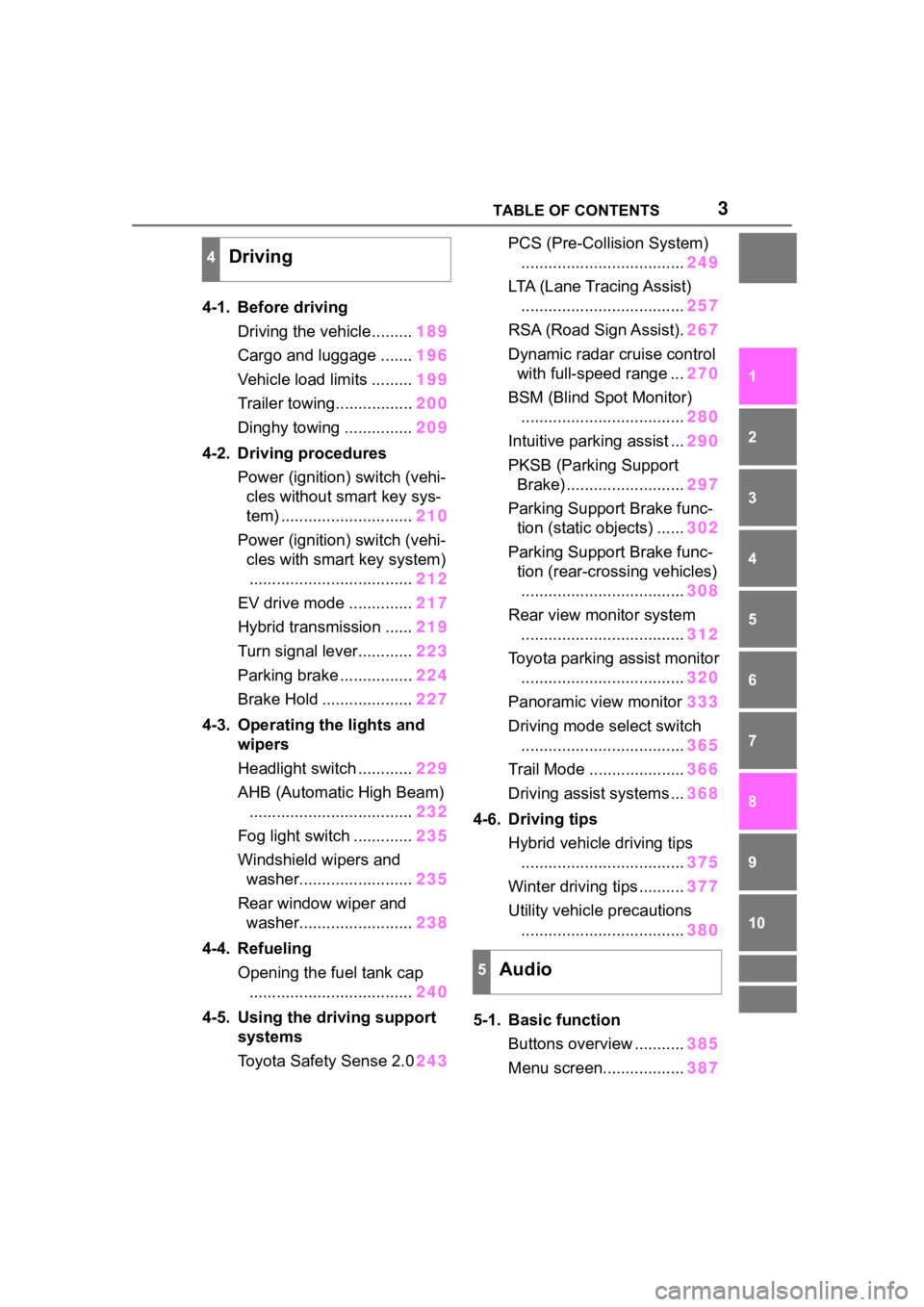
3TABLE OF CONTENTS
1
2
3
4
5
6
7
8
9
10
4-1. Before drivingDriving the vehicle......... 189
Cargo and luggage ....... 196
Vehicle load limits ......... 199
Trailer towing................. 200
Dinghy towing ............... 209
4-2. Driving procedures Power (ignition) switch (vehi-cles without smart key sys-
tem) ............................. 210
Power (ignition) switch (vehi- cles with smart key system).................................... 212
EV drive mode .............. 217
Hybrid transmission ...... 219
Turn signal lever............ 223
Parking brake ................ 224
Brake Hold .................... 227
4-3. Operating the lights and wipers
Headlight switch ............ 229
AHB (Automatic High Beam) .................................... 232
Fog light switch ............. 235
Windshield wipers and washer......................... 235
Rear window wiper and washer......................... 238
4-4. Refueling Opening the fuel tank cap.................................... 240
4-5. Using the driving support
systems
Toyota Safety Sense 2.0 243PCS (Pre-Collision System)
.................................... 249
LTA (Lane Tracing Assist) .................................... 257
RSA (Road Sign Assist). 267
Dynamic radar cruise control with full-speed range ... 270
BSM (Blind Spot Monitor) .................................... 280
Intuitive parking assist ... 290
PKSB (Parking Support Brake) .......................... 297
Parking Support Brake func- tion (static objects) ...... 302
Parking Support Brake func- tion (rear-crossing vehicles).................................... 308
Rear view monitor system .................................... 312
Toyota parking assist monitor .................................... 320
Panoramic view monitor 333
Driving mode s elect switch
.................................... 365
Trail Mode ..................... 366
Driving assist systems ... 368
4-6. Driving tips Hybrid vehicle driving tips.................................... 375
Winter d
riving tips .......... 377
Utility vehicle precautions .................................... 380
5-1. Basic function Buttons overview ........... 385
Menu screen.................. 387
4Driving
5Audio
Page 4 of 744

4TABLE OF CONTENTS
Status icon ....................388
“Setup” screen .............. 390
5-2. Basic information before operation
Initial screen .................. 391
Touch screen................. 392
Home screen................. 394
Entering letters and num- bers/list screen operation.................................... 395
Screen adjustment ........ 398
Linking multi-information dis- play and the system .... 399
5-3. Connectivity settings Registering/Connecting a Bluetooth
® device ....... 400
Setting Bluetooth
® details
.................................... 404
Wi-Fi
® Hotspot .............. 412
5-4. Apple CarPlay/Android Auto
Apple CarPlay
®/Android Auto
.................................... 417
5-5. Other settings General settings ............ 424
Voice settings ................ 428
Vehicle settings ............. 429
5-6. Using the audio/visual sys- tem
Quick reference............. 430
Some basics ................. 431
5-7. Radio operation AM/FM/SiriusXM (SXM) radio.................................... 435
5-8. Media operation USB memory................. 442iPod/iPhone (Apple CarPlay)
.................................... 444
Android Auto .................. 447
Bluetooth
® audio ........... 448
5-9. Audio/visual remote con- trols
Steering switches .......... 452
5-10.Audio settings Setup ............................. 454
5-11.Tips for operating the audio/visual system
Operating information .... 456
5-12.Voice command system operation
Voice command system 468
Command list ................ 471
5-13.Phone operation (Hands- free system for cellular
phones)
Quick reference ............. 475
Some basics .................. 476
Placing a call using the Blue- tooth
® hands-free system
.................................... 480
Receiving a call using the Bluetooth
® hands-free sys-
tem .............................. 483
Talking on the Bluetooth
®
hands-free system ....... 484
Bluetooth
® phone message
function ........................ 486
5-14.Phone settings Setup ............................. 491
5-15.What to do if... (Blue- tooth
®)
Troubleshooting............. 501
Page 5 of 744
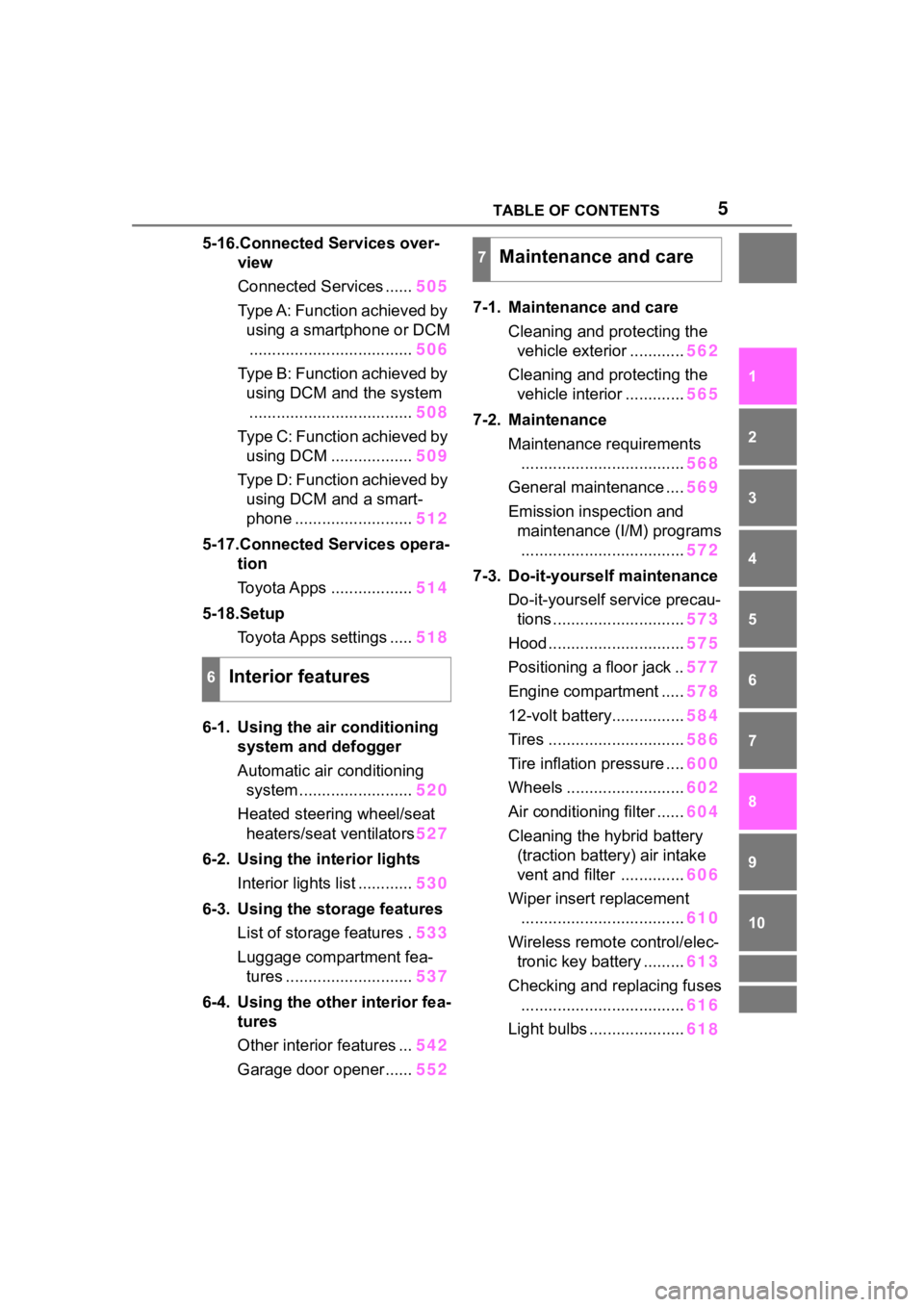
5TABLE OF CONTENTS
1
2
3
4
5
6
7
8
9
10
5-16.Connected Services over-view
Connected Services ...... 505
Type A: Function achieved by using a smartphone or DCM.................................... 506
Type B: Function achieved by using DCM and the system
.................................... 508
Type C: Function achieved by using DCM .................. 509
Type D: Function achieved by using DCM and a smart-
phone .......................... 512
5-17.Connected Services opera- tion
Toyota Apps .................. 514
5-18.Setup Toyota Apps settings ..... 518
6-1. Using the air conditioning
system and defogger
Automatic air conditioning system ......................... 520
Heated steering wheel/seat heaters/seat ventilators 527
6-2. Using the interior lights Interior lights list ............ 530
6-3. Using the storage features List of storage features . 533
Luggage compartment fea- tures ............................ 537
6-4. Using the other interior fea- tures
Other interior features ... 542
Garage door opener...... 5527-1. Maintenance and care
Cleaning and protecting the vehicle exterior ............ 562
Cleaning and protecting the vehicle interior ............. 565
7-2. Maintenance Maintenance requirements.................................... 568
General maintenance .... 569
Emission inspection and maintenance (I/M) programs.................................... 572
7-3. Do-it-yourself maintenance Do-it-yourself service precau-tions ............................. 573
Hood .............................. 575
Positioning a floor jack .. 577
Engine compartment ..... 578
12-volt battery................ 584
Tires .............................. 586
Tire inflation pressure .... 600
Wheels .......................... 602
Air conditioning filter ...... 604
Cleaning the hybrid battery (traction battery) air intake
vent and filter .............. 606
Wiper insert replacement .................................... 610
Wireless remote control/elec- tronic key battery ......... 613
Checking and replacing fuses .................................... 616
Light bulbs ..................... 61
8
6Interior features
7Maintenance and care
Page 6 of 744
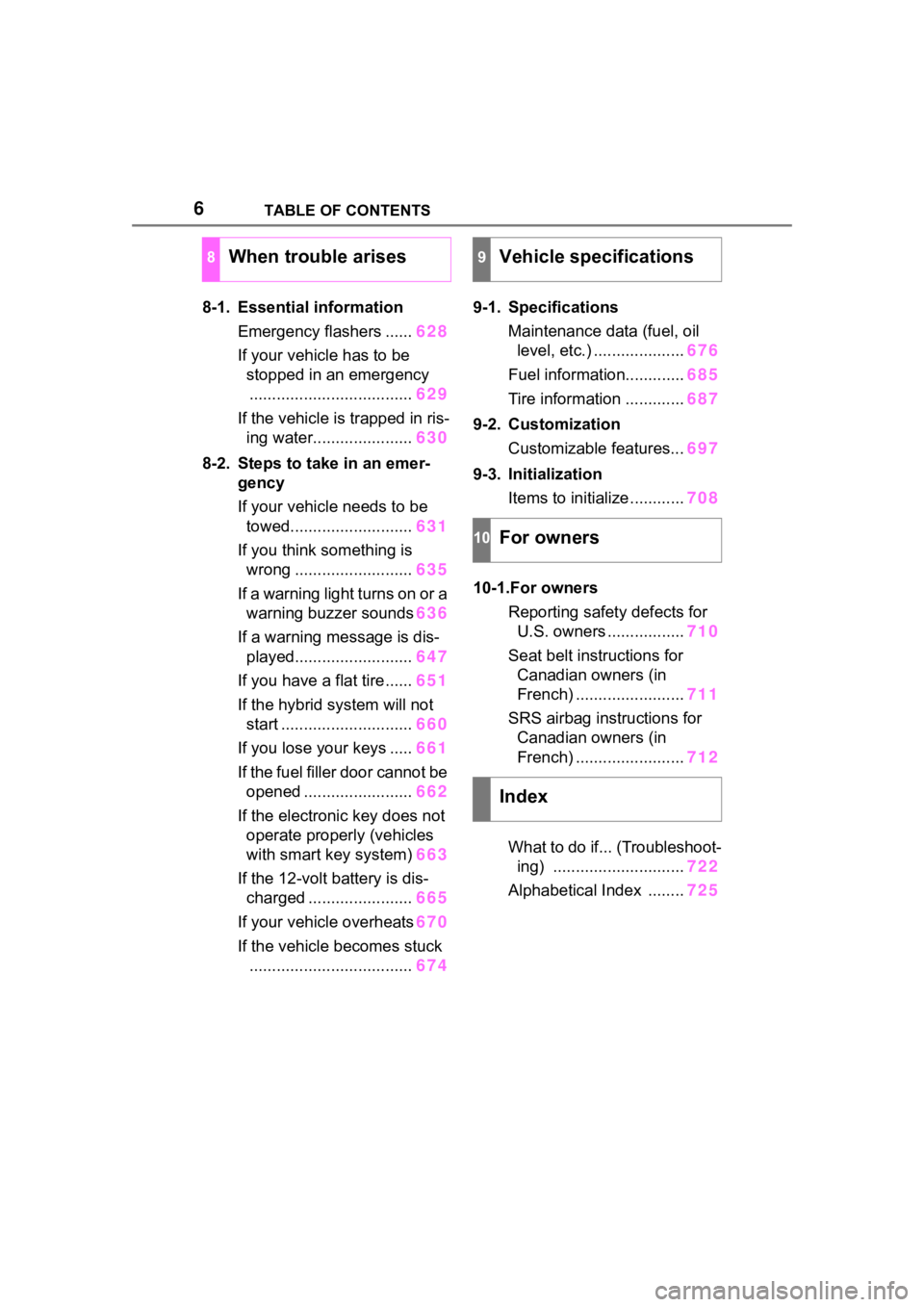
6TABLE OF CONTENTS
8-1. Essential informationEmergency flashers ...... 628
If your vehicle has to be stopped in an emergency.................................... 629
If the vehicle is trapped in ris- ing water...................... 630
8-2. Steps to take in an emer- gency
If your vehicle needs to be
towed........................... 631
If you think something is wrong .......................... 635
If a warning light turns on or a warning buzzer sounds 636
If a warning message is dis- played.......................... 647
If you have a flat tire...... 651
If the hybrid system will not start ............................. 660
If you lose your keys ..... 661
If the fuel filler door cannot be opened ........................ 662
If the electronic key does not operate properly (vehicles
with smart key system) 663
If the 12-volt battery is dis- charged ....................... 665
If your vehicle overheats 670
If the vehicle becomes stuck .................................... 6749-1. Specifications
Maintenance data (fuel, oil level, etc.) .................... 676
Fuel information............. 685
Tire information ............. 687
9-2. Customization Customizable features... 697
9-3. Initialization Items to initialize ............ 708
10-1.For owners Reporting safet y defects for
U.S. owners ................. 710
Seat belt instructions for Canadian owners (in
French) ........................ 711
SRS airbag instructions for Canadian owners (in
French) ........................ 712
What to do if... (Troubleshoot- ing) ............................. 722
Alphabetical Index ........ 725
8When trouble arises9Vehicle specifications
10For owners
Index
Page 7 of 744

7TABLE OF CONTENTS
1
2
3
4
5
6
7
8
9
10
Page 8 of 744
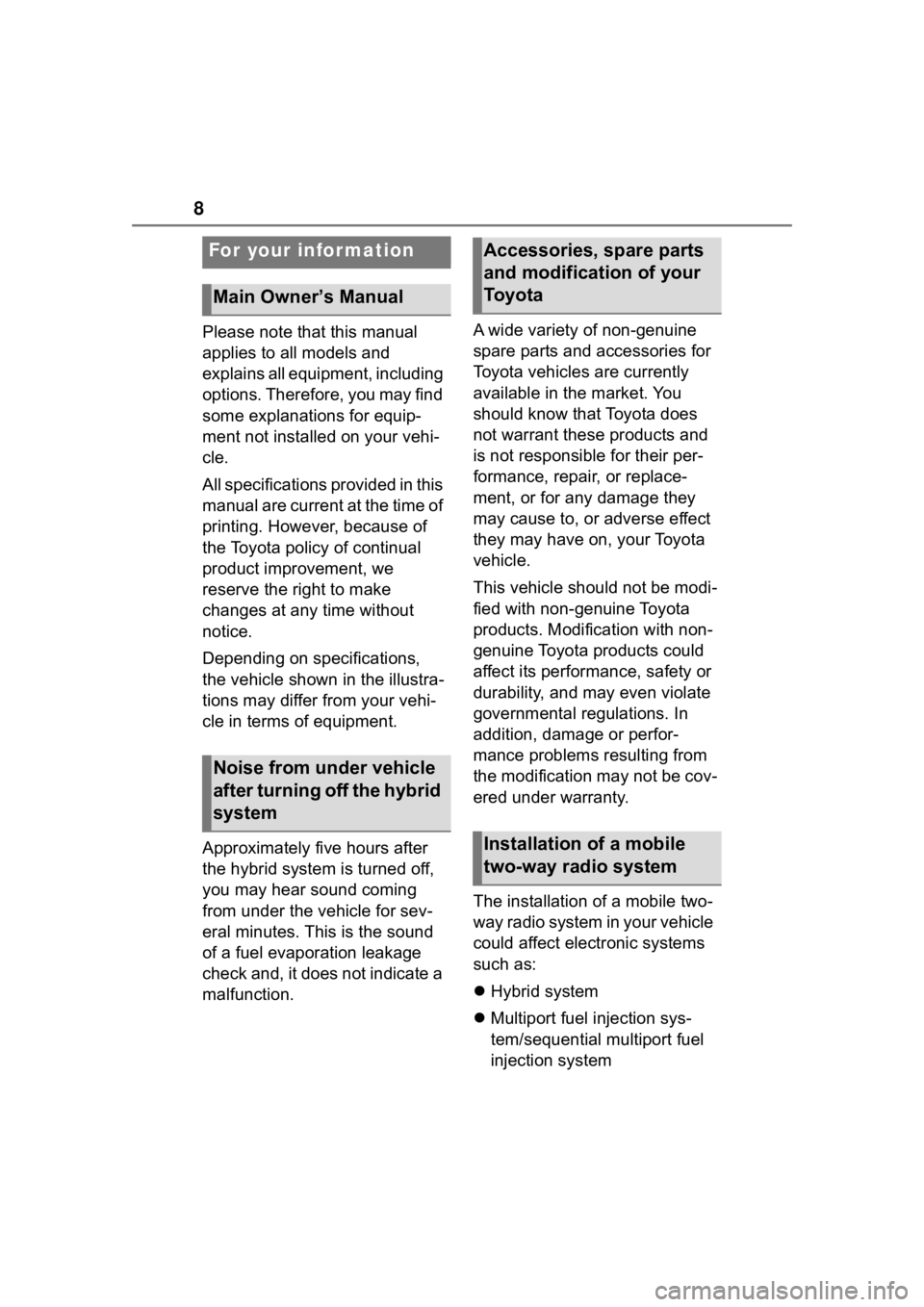
8
Please note that this manual
applies to all models and
explains all equipment, including
options. Therefore, you may find
some explanations for equip-
ment not installed on your vehi-
cle.
All specifications provided in this
manual are current at the time of
printing. However, because of
the Toyota policy of continual
product improvement, we
reserve the right to make
changes at any time without
notice.
Depending on specifications,
the vehicle shown in the illustra-
tions may differ from your vehi-
cle in terms of equipment.
Approximately five hours after
the hybrid system is turned off,
you may hear sound coming
from under the vehicle for sev-
eral minutes. This is the sound
of a fuel evaporation leakage
check and, it does not indicate a
malfunction.A wide variety of non-genuine
spare parts and accessories for
Toyota vehicles are currently
available in the market. You
should know that Toyota does
not warrant these products and
is not responsible for their per-
formance, repair, or replace-
ment, or for any damage they
may cause to, or adverse effect
they may have on, your Toyota
vehicle.
This vehicle should not be modi-
fied with non-genuine Toyota
products. Modification with non-
genuine Toyota products could
affect its performance, safety or
durability, and may even violate
governmental regulations. In
addition, damage or perfor-
mance problems resulting from
the modification may not be cov-
ered under warranty.
The installation of a mobile two-
way radio system in your vehicle
could affect electronic systems
such as:
Hybrid system
Multiport fuel injection sys-
tem/sequential multiport fuel
injection system
For your information
Main Owner’s Manual
Noise from under vehicle
after turning off the hybrid
system
Accessories, spare parts
and modification of your
To y o t a
Installation of a mobile
two-way radio system
Page 9 of 744

9
Toyota Safety Sense 2.0
Anti-lock brake system
SRS airbag system
Seat belt pretensioner system
Be sure to check with your Toy-
ota dealer for precautionary
measures or special instructions
regarding installation of a mobile
two-way radio system.
High voltage parts and cables
on the hybrid vehicles emit
approximately the same amount
of electromagnetic waves as the
conventional gasoline powered
vehicles or home electronic
appliances despite of their elec-
tromagnetic shielding.
Unwanted noise may occur in
the reception of the mobile two-
way radio.
The vehicle is equipped with
sophisticated computers that will
record certain data, such as:
• Engine speed/ Electric motor speed (traction motor speed)
• Accelerator status
• Brake status
• Vehicle speed
• Operation status of the driving assist systems
• Images from the front camera (available only when certain
safety systems are activated,
which varies depending on
the vehicle specifications). • Hybrid battery (traction bat-
tery) status
The recorded data varies
according to the vehicle grade
level and options with which it is
equipped.
These computers do not record
conversations or sounds, and
only record images outside of
the vehicle in certain situations.
Data Transmission
Your vehicle may transmit the data
recorded in these computers to
Toyota without notification to you.
Data usage
Toyota may use the data recorded
in this computer to diagnose mal-
functions, conduct research and
development, and improve quality.
Toyota will not disclose the
recorded data to a third party
except:
• With the consen t of the vehicle
owner or with the consent of the
lessee if the vehicle is leased
• In response to an official request by the police, a court of law or a
government agency
• For use by Toyota in a lawsuit
• For research purposes where the data is not tied to a specific vehi-
cle or vehicle owner
Recorded image information
can be erased by your Toyota
dealer.
The image recording function can
be disabled. However, if the func-
tion is disabled, data from when the
system operates will not be avail-
Vehicle data recording
Page 10 of 744
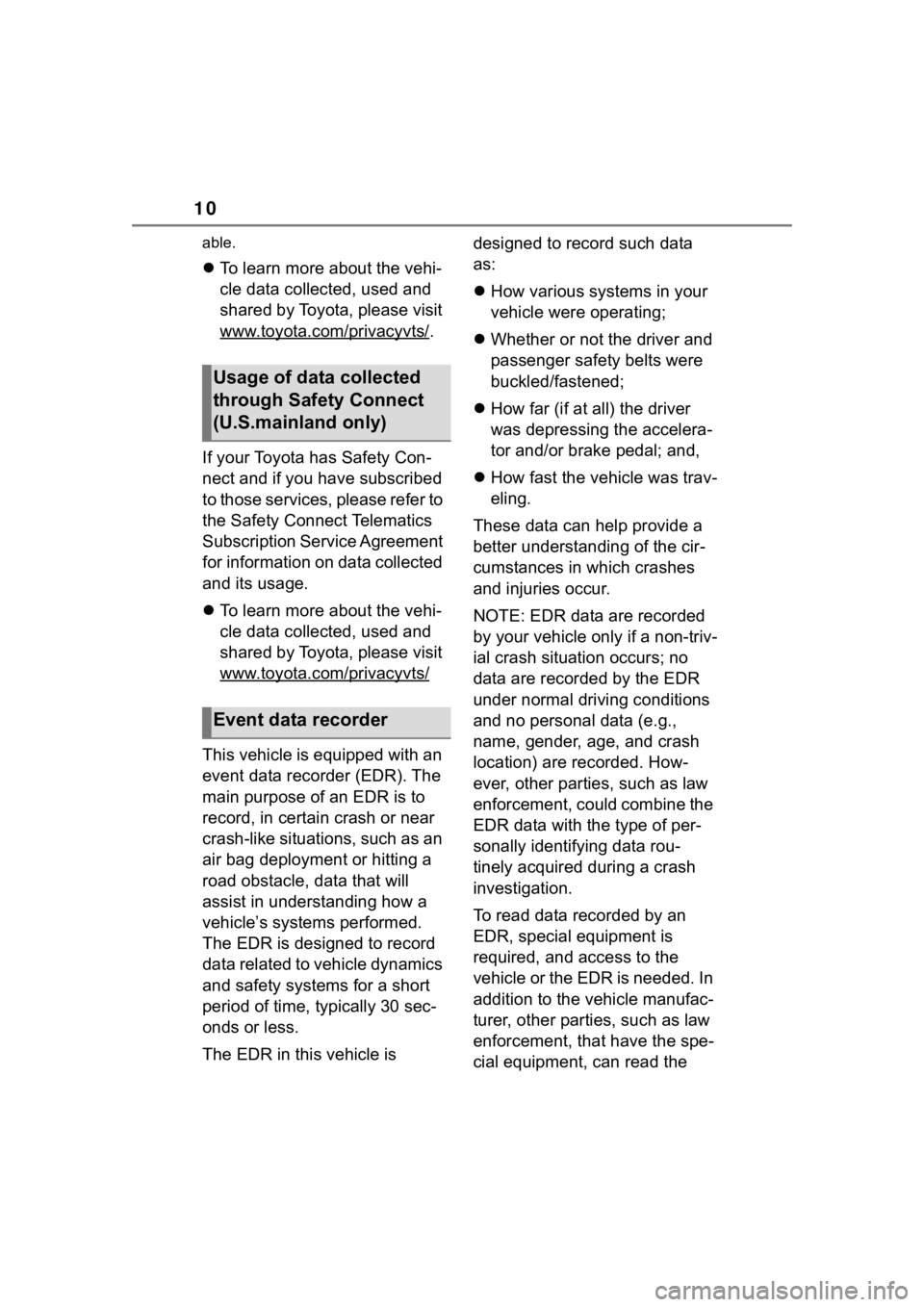
10
able.
To learn more about the vehi-
cle data collected, used and
shared by Toyota, please visit
www.toyota.com/privacyvts/
.
If your Toyota has Safety Con-
nect and if you have subscribed
to those services, please refer to
the Safety Connect Telematics
Subscription Service Agreement
for information on data collected
and its usage.
To learn more about the vehi-
cle data collected, used and
shared by Toyota, please visit
www.toyota.com/privacyvts/
This vehicle is equipped with an
event data recorder (EDR). The
main purpose of an EDR is to
record, in certain crash or near
crash-like situations, such as an
air bag deployment or hitting a
road obstacle, data that will
assist in understanding how a
vehicle’s systems performed.
The EDR is designed to record
data related to vehicle dynamics
and safety systems for a short
period of time, typically 30 sec-
onds or less.
The EDR in this vehicle is designed to record such data
as:
How various systems in your
vehicle were operating;
Whether or not the driver and
passenger safety belts were
buckled/fastened;
How far (if at all) the driver
was depressing the accelera-
tor and/or brake pedal; and,
How fast the vehicle was trav-
eling.
These data can help provide a
better understanding of the cir-
cumstances in which crashes
and injuries occur.
NOTE: EDR data are recorded
by your vehicle only if a non-triv-
ial crash situation occurs; no
data are recorded by the EDR
under normal driving conditions
and no personal data (e.g.,
name, gender, age, and crash
location) are recorded. How-
ever, other parties, such as law
enforcement, could combine the
EDR data with the type of per-
sonally identifying data rou-
tinely acquired during a crash
investigation.
To read data recorded by an
EDR, special equipment is
required, and access to the
vehicle or the EDR is needed. In
addition to the vehicle manufac-
turer, other parties, such as law
enforcement, that have the spe-
cial equipment, can read the
Usage of data collected
through Safety Connect
(U.S.mainland only)
Event data recorder